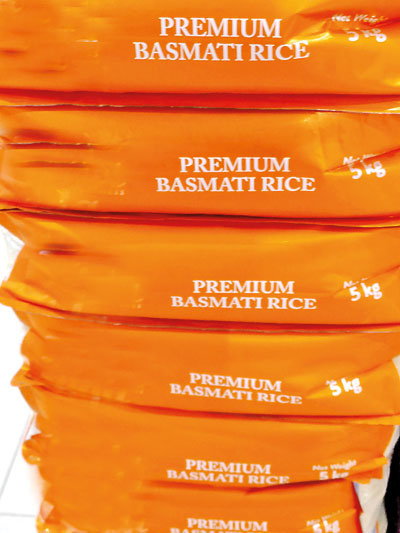News
If no aroma, not fluffy when cooking, you’re being duped; it’s not Basmati
“Fake” Basmati rice has infiltrated rice markets, warned the Consumer Affairs Authority (CAA), as it started an island-wide search this week for traders selling long grain white rice as Basmati to unsuspecting customers.

CAA on the hunt for fake Basmati. Pic by Priyankara Samaraweera
If Basmati rice bought from a retailer or a lunch packet purporting to contain Basmati lacks the aroma or fluffy nature when cooked, it might be because it’s fake, CAA’s Director (Consumer Affairs and Information) Asela Bandara said.
Legal action is to be taken against nine Pettah-based rice importers for bringing down long grain white rice and selling it as Basmati in the retail market.
“We obtained samples and sent them to the laboratory of the Rice Research Institute located in Bathalagoda and it was confirmed that the samples were of a white raw rice variety and definitely not Basmati,” Mr Bandara said. White raw rice is now sold at Rs. 90- 93 per kilo while Basmati is around Rs. 225 per kilo.
On May 28 this year, the CAA issued a gazette (2177/9) on maximum price of rice varieties with white raw rice to be sold at only Rs.93.
“As this is a white rice variety, legal action will be taken against importers and traders over the violation of the gazette as well as for misleading the public,” Mr Bandara warned.
The Consumer Affairs Authority Act No. 9 of 2003 states that “No trader shall, in the course of a trade or business, engage in any type of conduct that is misleading or deceptive or is likely to mislead or deceive the consumer” and that making misleading price increases can be a punishable offence.
If found guilty, the penalty will be between Rs.10,000 and 100,000 for a first-time offence. If repeated, a fine of between Rs.20,000-200,000 will be imposed.
“We found that 25 kilo-bags of long grain white rice have been sold to eateries and restaurants, as well as retailed in shops as Basmati,” he said. “For now, the public is requested to buy Basmati rice that bears the name of the company and country of origin on the cover. Go for known brands and be watchful when purchasing in the retail market.”
CAA officers island-wide have commenced inspections and are sending suspicious samples to be laboratory tested, he said.
“Imported rice such as Basmati is charged with a 55 rupee tax per kilo,” he said. “As it is not much profitable, traders resort to these kinds of malpractices.”
Spotting the difference between Basmati and ordinary white long grain rice is difficult prior to cooking, as both the varieties are imported from Pakistan and the North Indian regions and are similar in appearance, said Dr M J B D Senanayake, Director (Rice Research and Development) of the Rice Research and Development Institute in Bathalagoda.
“It is only when cooking that an aroma is released from the Basmati grain,” he explained. “When cooked, this fake Basmati long slender rice takes the shape of a banana with a curve and does not have the fragrance.”
“Though the consumption of Basmati in our country is a small percentage compared to other rice varieties, authorities should ensure the costly grain available in the market is the original variety,” he said, adding that their laboratory is received many samples both from the CAA and Customs before releasing rice containers to the market.

